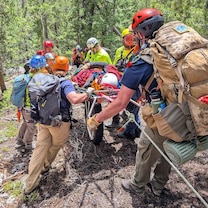Travel will take a toll, but athletes don't have to lose sleep over it
— -- Sure, it can be tiring going to work after a bad night's sleep shortened by a snoring spouse, a bawling baby or staying up late to watch a game that didn't end until after midnight (and during which your team lost). But at least you didn't have to spend the night flying across a continent -- or farther -- before battling elite competitors who are trying to bust your chops.
That's what athletes often must go through.
Consider the Denver Nuggets, who will play the Indiana Pacers in London on Thursday (3 p.m. ET) as part of the NBA's Global Games series. Between Saturday night's game in Oklahoma City and the London contest, the Nuggets were given just four days off to adjust to a difference of six time zones. They will then get three days off before their next game, which is back in Denver, a seven-hour change from London. Then the Nuggets will fly to Los Angeles and face the Lakers the very next night.
How does so much travel affect athletes' sleep and performance?
"It depends where they have to travel and how far they have to travel and how long they're going to be there," said Pat Byrne, a sleep and fatigue scientist. "Every sport has differences. If you're in the NBA and you're back and forth across the coast and playing back-to-back games, jet lag immediately [hits]."
Lack of sleep can affect reaction time and also lower testosterone levels, both of which are significant in sport. This is especially the case in the NBA, MLB and NHL; teams sometimes play late into the night and then have to fly several time zones away to play the next day. Even that might not be as bad as in the Kontinental Hockey League, where teams are spread across eight time zones in Europe and Asia.
And then there is the NFL, which will send a quarter of the league, eight teams, to London for four games next season.
"Travel and sleep are just destroying these athletes, and I think that's what the NBA really needs to think about," Golden State Warriors assistant general manager Kirk Lacob said at a sports biometrics conference in November. "And they are [thinking about it], but the reality is when you travel four times a week, and you're on a plane that long right after you played, it's not a good recovery period at all for the body being up in the air like that, and in a chair. It's not good."
The NBA has been making a concerted effort to help players via sleep therapists, flight improvements and other means. Yet with 82 games over a 170-day regular season spread across four North American time zones, there are only so many things that can be done. As Lacob points out: When a team's plane lands in another time zone at 2 a.m., you can't tell players to get to sleep within 15 minutes and not wake up until nine hours later.
Byrne, who has worked with a variety of pro teams, says the "sleep thing" is so new that many people throughout sports don't know nearly enough about it. Some teams, he said, are even wasting efforts with bogus technology that doesn't help.
"What we're trying to teach the teams is how the sleep directly affects the players' reaction time and how it affects the whole team's performance, so they can make smarter decisions," Byrne said.
The challenges of intercontinental travel can be even tougher for athletes in tennis and Olympic sports than for teams.
"We're talking about athletes who are going to Europe or Asia, so they're dealing with nine hours, 12 hours. It's just a different ballpark," said Lindsay Thornton, a senior sports psychophysiologist with the United States Olympic Committee. "Not to say that continental travel doesn't impact your circadian rhythm and your performance -- it does -- but [traveling between continents] affects it a lot more."
Thornton explained that the rule of thumb is to have one day to adapt to each time zone changed -- for example, a six-hour change equals six days. With all the obstacles athletes face when traveling that far, part of their job is to shift their body clocks before and after the trip.
American Olympic champion speedskater Eric Heiden, now an orthopedic surgeon, says he would go to bed one hour earlier each night the week before traveling to Europe to reduce the impact of jet lag.
"The second day [there] things start to get rebooted, and then the third day, it's like the operating system gets turned on again," Heiden said. "By the fourth day, it does not matter how many time zones you crossed, you are theoretically set."
Novak Djokovic is something of an expert on the topic. The world's second-ranked men's tennis player traveled between continents 10 times for tournaments in 2016. Djokovic says he has heard about the time-zone-per-day theory of sleep adjustment but, like Heiden, thinks you can speed up the process.
"I believe in nutrition and the hydration and the mental side of it," Djokovic said. "If you prepare yourself for going already to that place, if you set your clock, your watch, to that time zone and you really kind of devote yourself already to that part of the world, then it seems easier."
Byrne, however, says although a person could feel completely normal over a shorter span, an objective reaction test might show the adjustment wasn't actually 100 percent.
So what can be done? Making travel as comfortable as possible is a good start.
San Francisco Giants strength and conditioning coach Geoff Head says many teams have seats on the plane that can be made into totally flat beds. He also advises wearing compression garments, which research shows can help with recovery.
Other methods used as sleep aids during flights include placing lavender on pillows, drinking tart cherry juice and wearing blue-blocker glasses.
After arrival, Byrne says going outside for several hours during the day helps to reset the body clock by decreasing the production of melatonin, which induces tiredness.
Something as simple as changing travel times can help matters, too.
Byrne is based in Vancouver, British Columbia, and has worked with the NHL's Canucks, who would often struggle in their first home game after returning from the East Coast. He suggested that instead of flying home immediately after a game in, say, New York, the team would fare better by spending the night there to get good sleep before traveling the next day. That did help, although not everybody was a fan of the solution. "I became public enemy No. 1 among the hockey wives because they wanted their husbands home quick to help look after the kids," he said with a smile.
Ultimately, it's all about how you psychologically deal with what your body is doing. "So what I say to people is, think about when you leave and when you get there," Byrne said. "If you get to Europe in the morning, you better treat that flight like the night."
The Jacksonville Jaguars, who have been playing one game in London each season since 2013 and will do so until at least 2020, make it mandatory for players to sleep on the flights to England, providing sleeping pills in some cases.
Even the best practices won't completely eliminate the negative impact of travel on athletic performance, but it certainly is better than the old days, when most teams traveled on commercial flights in cramped seats with babies screeching loudly around them.
And maybe sleep will be less of an issue if travel eventually enters the "Star Trek" age of teleportation (and the NFL plays games on Mars). As Lacob said with a laugh: "Maybe we can come up with a way to transport guys."




